Confidential Investigative Report Examples to Download
Do you have a secret that you never want to tell anyone whether they may be someone close to you or not? Have you ever had something confidential to share but you seem to hesitate, knowing some people may not want to know about it or may use it against you? In life, people have a choice of telling others through reports either made public or private. There are of course some things in life that should be kept confidential as well as there are some things you need not share with everyone else.
Nobody needs to know every little detail that should be kept away from those who prefer to use it for gossip. This includes private matters that should be discussed only by the people you trust. This is also true for investigative reports. There are some investigation reports that are best kept from the public unless necessary enough to share. But most of these kinds of reports are kept confidential. If you are interested in knowing how to keep investigative reports confidential, you should check out these 4+ examples of confidential investigative reports now.
4+ Confidential Investigative Report Examples
1. Confidential Investigation Report Template
2. Sample Confidential Investigative Report
3. School District Confidential Investigative Report
4. Confidential Investigative Report Example
5. Printable Confidential Investigation Report
What Is a Confidential Investigation Report?
When you hear confidential and investigative reports in a sentence, the first thing you may be wondering would be aren’t they always confidential? Some investigative reports can be made public, especially if the information in the reports are not too dangerous or if the public must be told about it. However, there are some investigative reports that are kept confidential for a reason. The reasons may differ but the most common ones are the privacy of those who may be under investigation as well as the incident. In addition to that a confidential investigative report means a document that could be used in court if the incidents are more than what meets the eye. In this case, reports that need the court of law to be handled are most likely to be confidential.
Any investigative report that has been passed or made by a concerned citizen can also be considered confidential. The purpose of a confidential investigative report is to protect a person’s privacy as well as to be able to handle the incident in a professional manner. This way, it would be less of a problem if the right people are handling it than to let everyone know and assume what went wrong. Confidential investigative reports are most commonly seen in courts, police reports, or even office reports. If it is stated as confidential, only the right people are allowed to read and to find a solution for this.
How to Write a Confidential Investigative Report?
Ever wondered how a confidential investigative report is written or what is in a confidential investigative report? For those who have written down one and for those who have not, something that needs to be taken into consideration here is it differs. The incident, the information and how it is being prepared differs depending on who wrote it. So if you are curious as to what it looks like and what things are being placed or things that need to be avoided, check out some of the tips below.
1. Specific Information Required
Any kind of investigation report always needs information for it to be made into a valid point. However, there are some cases that would need the information to be specific. A blow by blow report of what happened in the incident for the investigation report to be clear. This specific information is then asked as a requirement for the report to be clear and can be used as a tool whether in court or as a form of a police report. But, there is something to avoid as well and that is untruthful information that could lead to issues regarding the information or any tampered information.
2. Introduction to the Investigative Report
Before writing out what is being asked in the investigation report, start with a small introduction. This helps warn the reader of anything that could trigger them or that could tarnish someone’s reputation. Introductions in an investigation report can also be used as a way to inform the people concerned that this report is kept a secret or confidential.
3. Document Any Given Evidence
Evidence is always necessary and useful when writing out a confidential investigation report. Not only are they useful, but they also help out with understanding the incident better. The more evidence that is being documented, the better understanding it gives to solve the issue.
4. Look For a Solution
After gathering all the evidence and enough understanding of what the incident is about, it is time to look for a solution. If the problem can be handled without having to go through a lot of papers and reports, do so. However, there are of course some incidents that need more than just updates and reports, look for a solution that benefits everyone involved in the case.
5. Sign the Report
Sign the report. Your signature would mean what you have written down in the report is true to your knowledge. That you would accept the consequences if what has been written has been tampered or untrue. Signing the report also means that you have agreed to be a witness to what has been discussed and to keep all information confidential.
FAQs
What is a confidential investigative report?
A document with information made to be confidential. A document that is reported by someone who believes the incident could affect others and should be kept confidential.
What should be avoided when writing a confidential investigative report?
Avoid accusing a person in the report if you do not have enough evidence to stake your claim. Avoid using jargon that is not common for those who will be reading the report. In addition to that, avoid information that is unnecessary and useless for your report. Only add information if you believe it would help you with the incident report.
Are questions a part of the confidential investigative report?
You can place questions in your report if you believe the report is too vague. Questions also help smooth out the information.
It goes without saying there are some things that need to be kept private and confidential. Like reporting an incident that happened while you were working or even to the police. Some reports that are kept confidential means that the privacy of those who may be involved are important as well as to not let others panic over what may be happening around them. It is also to ensure that what kind of problem it may be, would be solved as quietly as possible.
Confidential Investigative Report Examples to Download

Do you have a secret that you never want to tell anyone whether they may be someone close to you or not? Have you ever had something confidential to share but you seem to hesitate, knowing some people may not want to know about it or may use it against you? In life, people have a choice of telling others through reports either made public or private. There are of course some things in life that should be kept confidential as well as there are some things you need not share with everyone else.
Nobody needs to know every little detail that should be kept away from those who prefer to use it for gossip. This includes private matters that should be discussed only by the people you trust. This is also true for investigative reports. There are some investigation reports that are best kept from the public unless necessary enough to share. But most of these kinds of reports are kept confidential. If you are interested in knowing how to keep investigative reports confidential, you should check out these 4+ examples of confidential investigative reports now.
4+ Confidential Investigative Report Examples
1. Confidential Investigation Report Template
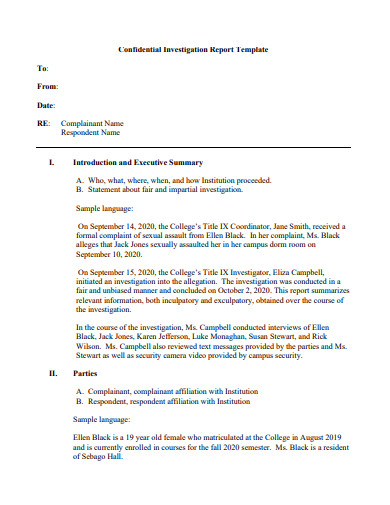
mccs.me.edu
Details
File Format
PDF
Size: 191 KB
2. Sample Confidential Investigative Report
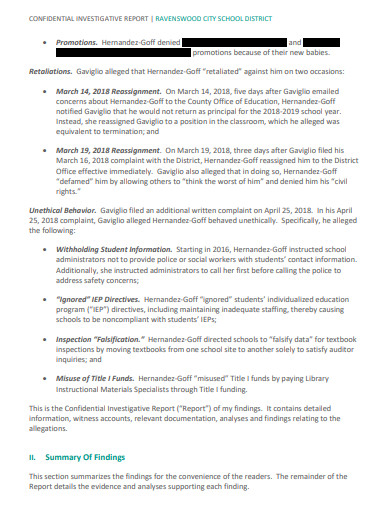
paloaltoonline.com
Details
File Format
PDF
Size: 981 KB
3. School District Confidential Investigative Report
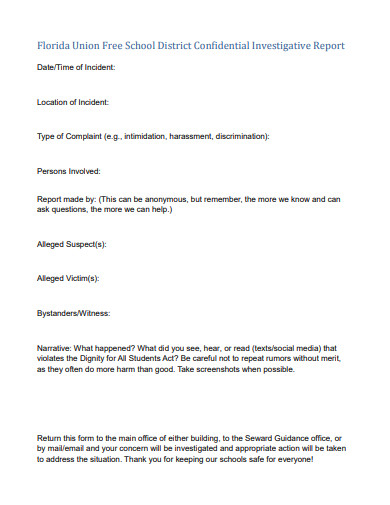
floridaufsd.org
Details
File Format
PDF
Size: 39 KB
4. Confidential Investigative Report Example
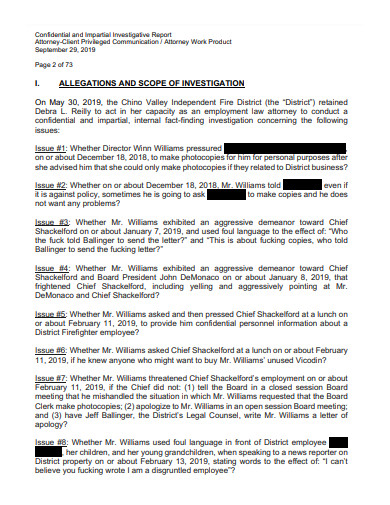
chinovalleyfire.org
Details
File Format
PDF
Size: 480 KB
5. Printable Confidential Investigation Report
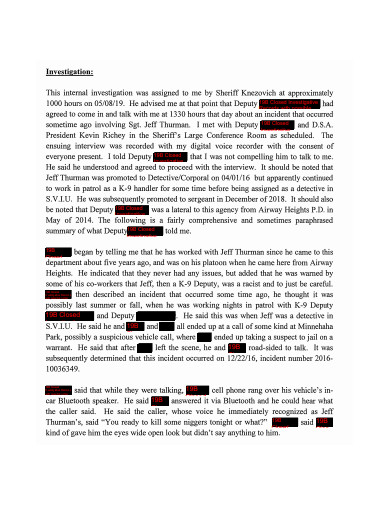
interactive.krem.com
Details
File Format
PDF
Size: 28 MB
What Is a Confidential Investigation Report?
When you hear confidential and investigative reports in a sentence, the first thing you may be wondering would be aren’t they always confidential? Some investigative reports can be made public, especially if the information in the reports are not too dangerous or if the public must be told about it. However, there are some investigative reports that are kept confidential for a reason. The reasons may differ but the most common ones are the privacy of those who may be under investigation as well as the incident. In addition to that a confidential investigative report means a document that could be used in court if the incidents are more than what meets the eye. In this case, reports that need the court of law to be handled are most likely to be confidential.
Any investigative report that has been passed or made by a concerned citizen can also be considered confidential. The purpose of a confidential investigative report is to protect a person’s privacy as well as to be able to handle the incident in a professional manner. This way, it would be less of a problem if the right people are handling it than to let everyone know and assume what went wrong. Confidential investigative reports are most commonly seen in courts, police reports, or even office reports. If it is stated as confidential, only the right people are allowed to read and to find a solution for this.
How to Write a Confidential Investigative Report?
Ever wondered how a confidential investigative report is written or what is in a confidential investigative report? For those who have written down one and for those who have not, something that needs to be taken into consideration here is it differs. The incident, the information and how it is being prepared differs depending on who wrote it. So if you are curious as to what it looks like and what things are being placed or things that need to be avoided, check out some of the tips below.
1. Specific Information Required
Any kind of investigation report always needs information for it to be made into a valid point. However, there are some cases that would need the information to be specific. A blow by blow report of what happened in the incident for the investigation report to be clear. This specific information is then asked as a requirement for the report to be clear and can be used as a tool whether in court or as a form of a police report. But, there is something to avoid as well and that is untruthful information that could lead to issues regarding the information or any tampered information.
2. Introduction to the Investigative Report
Before writing out what is being asked in the investigation report, start with a small introduction. This helps warn the reader of anything that could trigger them or that could tarnish someone’s reputation. Introductions in an investigation report can also be used as a way to inform the people concerned that this report is kept a secret or confidential.
3. Document Any Given Evidence
Evidence is always necessary and useful when writing out a confidential investigation report. Not only are they useful, but they also help out with understanding the incident better. The more evidence that is being documented, the better understanding it gives to solve the issue.
4. Look For a Solution
After gathering all the evidence and enough understanding of what the incident is about, it is time to look for a solution. If the problem can be handled without having to go through a lot of papers and reports, do so. However, there are of course some incidents that need more than just updates and reports, look for a solution that benefits everyone involved in the case.
5. Sign the Report
Sign the report. Your signature would mean what you have written down in the report is true to your knowledge. That you would accept the consequences if what has been written has been tampered or untrue. Signing the report also means that you have agreed to be a witness to what has been discussed and to keep all information confidential.
FAQs
What is a confidential investigative report?
A document with information made to be confidential. A document that is reported by someone who believes the incident could affect others and should be kept confidential.
What should be avoided when writing a confidential investigative report?
Avoid accusing a person in the report if you do not have enough evidence to stake your claim. Avoid using jargon that is not common for those who will be reading the report. In addition to that, avoid information that is unnecessary and useless for your report. Only add information if you believe it would help you with the incident report.
Are questions a part of the confidential investigative report?
You can place questions in your report if you believe the report is too vague. Questions also help smooth out the information.
It goes without saying there are some things that need to be kept private and confidential. Like reporting an incident that happened while you were working or even to the police. Some reports that are kept confidential means that the privacy of those who may be involved are important as well as to not let others panic over what may be happening around them. It is also to ensure that what kind of problem it may be, would be solved as quietly as possible.

